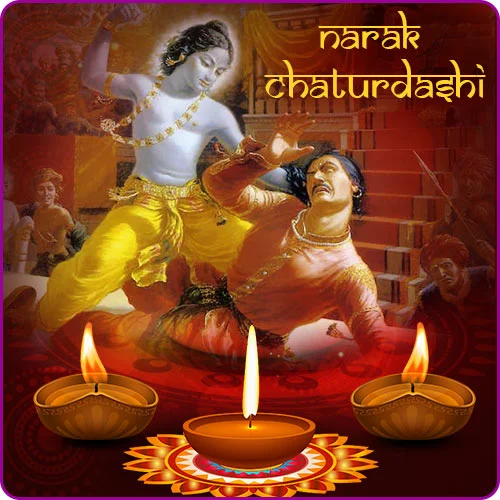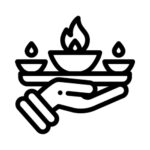Significance of Narak Chaturdashi- The second day of the Diwali celebration

Significance of Narak Chaturdashi- The second day of the Diwali celebration
The second day of Diwali festival, i.e. Chaturdashi is celebrated all over India by different names such as Narak Chaturdashi, Kali chaudas, Hanuman Jayanti or Roop Chaturdashi. The day symbolizes the victory of good over evil and light over darkness.
Significance of taking early bath, cleaning houses and lighting diyas on Chaturdashi
It is believed that from the early hours of Chaturdashi, the movement of the Universe from the Chandra-nadi (or the moon channel), into the Surya-nadi (or the Sun channel) begins as a result of which various rajsik and tamsik frequencies are emitted. During this movement, the heat which is generated from particles leads to the generation of sound waves from Paatal lok which further help in eradicating the protective sheath around the tamasik energies. For this reason, raja-tama particles that are present in the body cells begin to melt. So if a person takes a bath early in the morning then that person feels afresh. The person gets rid of all negative energies and is able to perform any auspicious act. In order to remove negative energies, houses are cleaned. Earthen diyas are also lit.
Popular Legends and Rituals
The day of Diwali carries a lot of significance. There are various legends, beliefs and rituals associated with the celebration of this day. Some of them are:-
The legend of Narkasur
Once the demon king Narakasur after defeating Lord Indra snatched the magnificent earrings of Aditi, the Mother of Goddess and imprisoned sixteen thousand daughters of the gods and saints in his prison.
Satyabhama came to know this and got angry. She prayed to Lord Krishna to give her power so that she could destroy Narakasur. As per legend, Narakasur had a curse that he would be killed by a woman. So, Lord Krishna gave power to Satyabhama to fight with Narakasur. Krishna himself became the charioteer of her ‘Ratha’ on the battlefield. Thus, Satyabhama beheaded Narakasur on a day before Narak Chaturdashi with the blessing of Krishna and released the imprisoned ladies from Narakasur’s prison. She also recovered the precious earrings of Mother Goddess Aditi.
Lord Krishna smeared his forehead with Narakasur’s blood. Then Lord Krishna returned home in the early morning of the Narak Chaturdashi day. The womenfolk massaged scented oil to his body and gave him a good bath to wash away the blood. From then onwards it became a custom to take a bath before sunrise on the day of Narak Chaturdash. The mother of the Narakasura, Bhoodevi, said that the death of her son should be celebrated instead of mourning. So people celebrate Narak chaudas with joy. On Narak Chaturdashi, people after waking up early in the morning, break any bitter fruit and apply the kumkum-oil paste, on their foreheads and then take a bath. The breaking of the fruit symbolizes the head of Narakasur and the kumkum-oil paste represents the blood that Lord Krishna smeared on his forehead.
The day of propitiating Maa Kali
Kali means Dark (evil) and Chaudas means Fourteenth. Kali Chaudas is the fourteenth day allotted to the worship in which Maha-Kali or Shakti is worshipped. As per belief, Kali killed the wickedest Raktbheej on this day. It is a sacred day to get rid of laziness and evil. Devotees offer delicacies prepared from pounded semi-cooked rice to the Goddess. Washing the head and applying kajal in the eyes keeps away the kali nazar (evil eye) on this day.
Naivedya (food)is offered by people to their ‘Kul Devi’ or Kul Devta, to drive away evil spirits. Food is also offered to forefathers.
The day to celebrate Hanuman Jayanti
The day of Narak Chaturdashi is also celebrated as the birthday of Hanumanji or Hanuman Jayanti. On this day, Hanumanji went to Ayodhya to deliver the message of Lord Rama’s return. People also light diyas on this day. Lord Hanuman is worshipped with oil, flowers, Chandan and Vermillion. Coconuts and naivedya prepared of Sesame seed, Brigadoon, rice, ghee and sugar are also offered to Hanuman ji.
The day to worship Lord Yamraj
Yamraj, the god of death, is also worshipped on the day of Narak Chaturdashi to attain good health and get freedom from fear of untimely death. According to an ancient tale, once there was a king named Ranti Deva. He was a religious and wise man. Lord Yamraj came to take his soul at the time of his death. When Yamraj came towards the king, he said that he had not done any evil deed throughout life, so why was he taking his soul to Narak? Lord Yamraj told him, that once he sent a priest go back hungry from his door. The King asked him to grant him a year’s time. Lord Yamraj pardoned his life for 1 year. When Lord Yamraj went, the king visited the saints and told them the entire story.
The saints advised the king to fast on the Kartik Krishna Paksha Chaturdashi, feed the priests and apologize for his mistakes before them. The king followed the rituals and got relief from his sin. One should light a lamp of four mouths along with sixteen small diyas on this day and worship the god with kheer, roli, Abeer, jaggery, colours and flowers. After that, the diyas should be placed in different corners of the house.
The day celebrated as Roop Chaudhas
Narak Chaturdashi is also celebrated as Roop Chaturthi. In order to get good looks, Lord Krishna is worshipped on this day. As per legend, there was a man named Yogiraj who wanted to unite with the Gods. But while in Samadhi he got bugs on his body and lice into his hair and eyebrows. He became sad after seeing his condition. At that time Narad visited him and asked the reason for his sadness. Listening to him, Lord Narad said that though he adopted the right path, he forgot to follow the body ethics. So he had to suffer these problems.
Yogiraj asked about body ethics. Lord Narad told him to observe fast on Kartik Krishna Paksha Chaturthi and worship the god for a healthy and beautiful body. By doing this, he gained back his health and beauty. So this day is known as Roop Chaturdashi.
The day tells us to clean our hearts and let the divine light shine in our lives.











